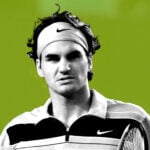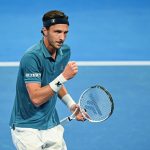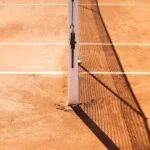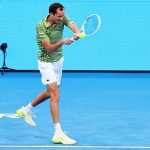Djokovic, The Wizard Of Oz
The Serbian is the undisputed master of the Australian Open, with a record seven titles under his belt, having made the Rod Laver Arena his playground. And one more time in 2020 he will contest the trophy on Sunday. Is it possible to put a finger on why he has he become such a boss in Oz?
 Australian Open 2020 – Novak Djokovic beats Roger Federer
Australian Open 2020 – Novak Djokovic beats Roger Federer
On Sunday for the eighth time, Novak Djokovic will contest an Australian Open title. And he now owns not only the record for titles won, but also for the number of finals played as by beating Roger Federer in the semi-finals (7-6(1), 6-4, 6-3) he took sole ownership of one more record. Novak Djokovic’s success in Australia is surely one of the greatest tricks he has played in his career. In a country whose love for heat should have been a nightmare for him, the Djoker found a way to trick the climate and took the habit to make there a statement of his GOAT-ability.
After seven titles (2008, 2011, 2012, 2013, 2015, 2016, 2019), 68 matches won for 8 losses, the statement is now crystal clear. When you think it all started with a bagel, when the then 18-year-old Djokovic was wiped out of the court in 2005 by the future winner Marat Safin (6-0, 6-2, 6-1)! All love stories don’t start with love at first sight. And the irony is that the Australian Open had all the reasons to be torture for a player who has always been struggling under the heat and the humidity. But as we now know the metal that Djokovic is made of, it makes total sense that he first made a point to find a way around the heatwaves, and then every year other points to repeat the performance.
Something of an “If I can make it here, I can make it anywhere” state of mind. A mindset that’s been tested here since the passing of his long-time friend Kobe Bryant: arrived in Melbourne all smile and ready to march on the draw after his strong showing in the ATP Cup, “Nole” has lost a part of this spark and also started to struggle with some niggles here and there, like stomach issues. He’s mostly kept it together until now, against a Milos Raonic in quarters against whose game he owns, and against a hampered Federer in the semis. He has one more match to go but it should be the toughest.
Overall, Australia has been through his career a great test of mental and physical strength, showing him what his weaknesses were. He made it a home and a launching pad for his season. When he became the physical warrior that he is now, it was to be not only a huge reason for his Aussie success but for his overall glory.
“He struggled way more in the early stages of his career,” confirms the Serbian journalist Sasa Ozmo. “He doesn’t like heat, that is true, but I think he hates humidity even more. That is why he occasionally struggled in New York, where it’s more humid than in Melbourne. He suffers in heat, but he is one of the physically best-prepared players, so he struggles yes, but at the same time that could work in his favor in an odd way.”
Djokovic turned weaknesses into strength
That’s true, because at his best “Nole” can endure the mental as much as physical discomfort well enough to go through that barrier and forget about it, and once it’s done, that’s the rivals he makes suffer. Breaking the wall he has become is a nightmare for most players in most tournaments, but it gets worse in Grand Slams when one has to take three sets out of him, and it turns to hell in Melbourne when one has to do it despite sometimes brutal conditions.
Maria Sharapova once told me that what she admired the most in Djokovic, whom she knows since they were teenagers, was how he turned weaknesses into strength, and that’s a major part of his success in Melbourne. He didn’t deny his limitations back in the day, he faced them and eradicated them: he gained not only an incredible fitness level but a mental fortitude that would bring him those seven Aussie crowns, and nine other Grand Slam titles.
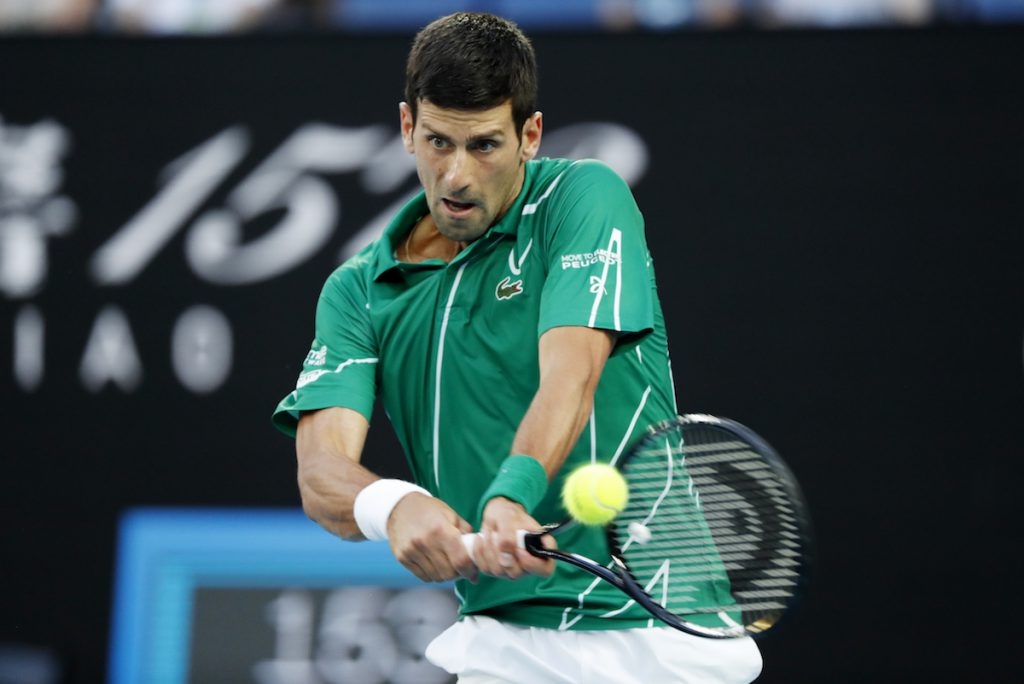
There’s absolutely no doubt that Djokovic’s physicality has been a huge reason of his domination of the Australian Open, combined to a surface that suits his game to perfection: a hard court, which he will always favor, one that’s fast but not too fast, an ideal bounce quality right on his hips level and a surface that is also so smooth that he can slide as much as he desires on it.
“When Novak is healthy, there is only one player that could compete with his fitness level and that is a healthy Rafael Nadal”, states the coach Mikael Tillström. “The court condition, the warm weather, the best of five format: all is in the favor of Novak. This time of the year, Novak has had time to prepare with his team and will always be hungry to win another Grand Slam. With the best return of the game and his court coverage, there is no easy game to win so the players get no rest even behind their serves… This is very tough mentally since you need free points to stay with him for 5 sets.”
And so they’re the ones who get cooked.
Unplayable in Melbourne like Rafa in Roland-Garros
Add a Rod Laver Arena where his confidence level is sky high, and the puzzle is complete.
“He’s won his first Slam there and he kind of went from there, then the good memories piled up”, says Ozmo. “Also, he’s always put a lot of emphasis on preseason and has been known to go out of the gates quickly. He feels something extra in Melbourne after winning so many matches.”
Among this confidence, there’s also a part of the legend that Djokovic has created thanks to some crazy matches and comebacks from the brink. For example, he got out of a horrific 100 unforced errors mess against Gilles Simon in 2016, got through a historical ordeal of nearly six hours against Nadal in the 2012 final, nearly lost his mind and legs last year against Daniil Medvedev for a moment, downed Andy Murray twice in the final with near escapes, and came back from the dead to beat Stan Wawrinka 12-10 in the fifth in 2014.
Those have built his confidence but also the fear in his opponents’ minds. “Novak, he always comes back, that’s the thing”, Rafael Nadal told me in Madrid in 2017. And if there’s someone who knows his Djoker book rule, that’s Rafa. Djokovic toyed with him in last year’s Australian Open final (6-3, 6-2, 6-3), as he had done with Roger Federer had for the first two sets of their 2016 semi-finals (6-1, 6-2, 3-6, 6-3). Think about it: in 2019, Djokovic had five unforced errors against Lucas Pouille in the semi-finals and nine against Nadal. Nine against Rafael Nadal. Unplayable. And in 2020, he has just lost one set on his way to the final, still proving to be the biggest ruler of this place in a way reminding Nadal and the Chatrier court.
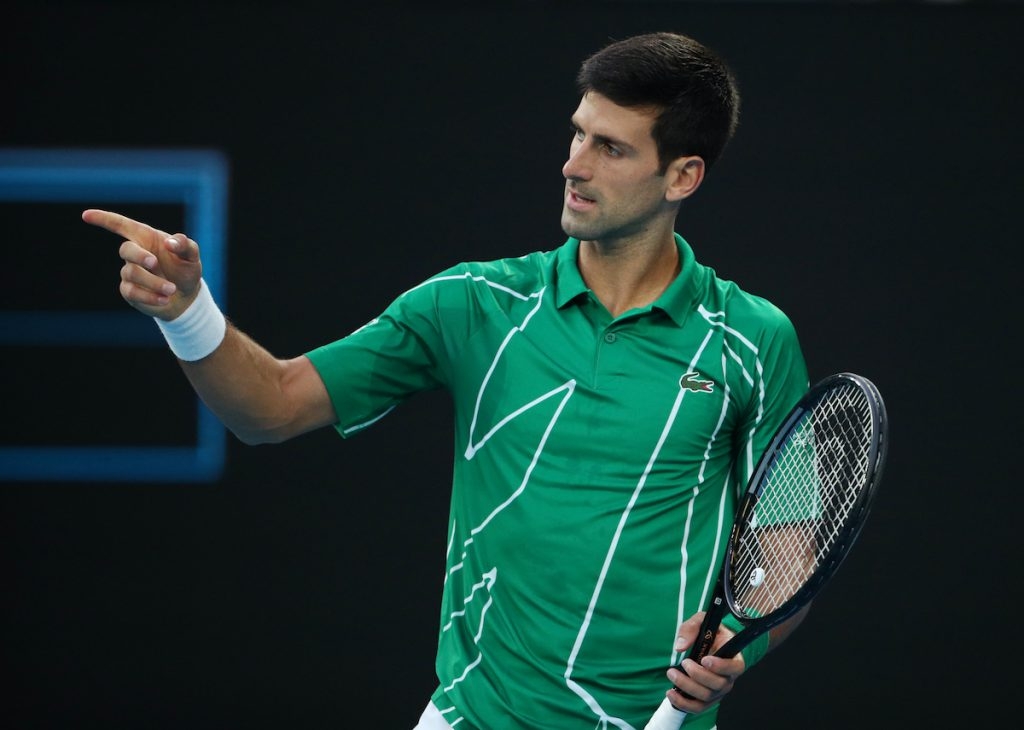
Those two matches against the greatest nemesis of his career have directly gone into the Djokovic mythology and are resources he can always come back to when he struggles through a match. Djokovic knows how great he can be in Melbourne: he sleeps every night there on a mattress of confidence whose equals are historically surely only Nadal’s one in Roland-Garros and Federer’s one in Wimbledon. Any other player coming on that court in front of him knows the pain that is coming and the quality of the giant that needs to be slain. As of today, each time they go for that match, they go against someone who has never lost a final in that court.
“Most players feel already after one set that the distance will be too far to go to outrun and outplay Novak and therefore many time players try too hard and play a game they can’t even control”, explains Tillström. Andre Agassi once said, even before his coaching time with the Serbian, that he saw no one going from defense to offense that well, and that even he at his best wasn’t taking the ball as early as what Djokovic constantly does. The pressure is non stop: the Djoker has his hand on his rival’s throat from the first point to the last.
After the Nole Slam, the Grand Slam ?
He is now a win away from title number 8 in Melbourne but also from Grand Slam number 17, closing, again and again, the gap between his greatness and Roger and Rafa’s ones. So stakes are high for his 26th Grand Slam finals as if he wants to stand alone when their careers are over, he needs to seize every chance. It’s like break points in the fifth set of a Grand Slam final. He needs to keep converting. He has already checked so many boxes, but he also knows that the record of Grand Slam titles would be a special, and maybe, decisive one.
The NextGen is also pushing behind the Big 3 so those legends know the race is now a sprint more than a marathon, even if Djokovic hopes they still can hold the fort for some time.
“The younger players are now coming up and challenging us oldies to get to the Grand Slam finals. It’s happening already. I think it’s good for the sport, but I’m going to try my best to delay their domination in the Grand Slam as much as possible. I’m sure Roger and Rafa would agree”, he said after his semi-finals with the biggest grin.
And as his second coach Goran Ivanisevic explained here: “You have to know that guys like him, to be in the final is not good enough.”
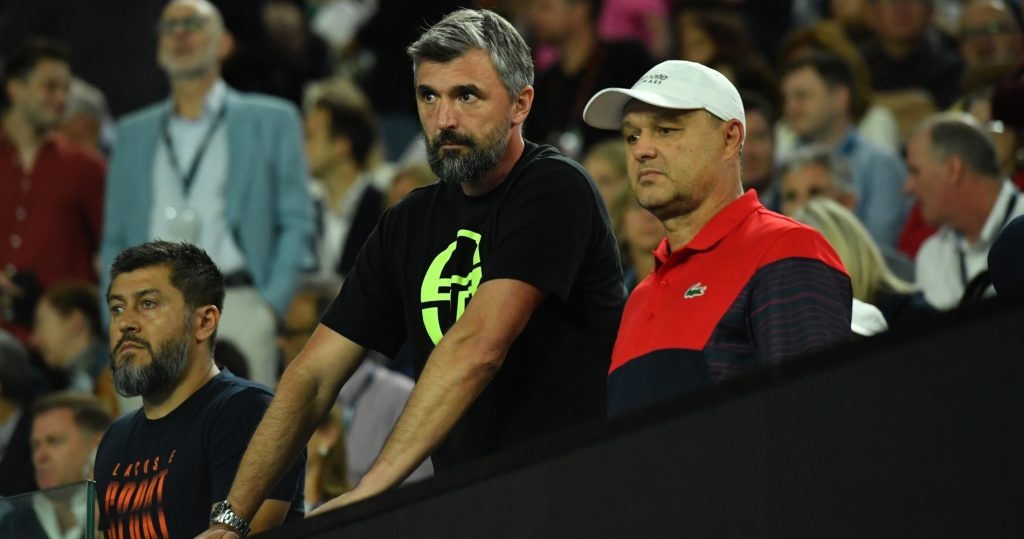
Of course Djokovic is not invincible in Melbourne, after all he lost eight matches (ok, through twelve years…), and he’s not getting any younger so he’s bound to have more bad days in the years to come than earlier. Still, if there’s a place where he can get away with a bad day, it’s in Melbourne, for all the reasons already stated and also for a last one: his belief in destiny. The ever spiritual Novak Djokovic feels a special tie with the Australian Open, as if this tournament had always been the guardian angel of his career. When he gets back to Melbourne, he feels safe.
Why? Because in 2008 at 20-year-old, that’s where he won his first Grand Slam title, dispatching Federer in the semi-finals. Because in 2010 when he lost against Jo-Wilfried Tsonga in the quarterfinals, the stomach upside down and after a terrible 2009 season, he said he hit rock bottom so hard that it was a wake-up call. Because in 2019, that’s where he won his Grand Slam title number 15, passing Pete Sampras on the record list. The Australian Open has always been extremely meaningful in the progress of Novak Djokovic’s career. Now the only man in the history to have seven Australian Open titles in the bag, the only one also to have won three consecutive titles here, he’s back in 2020 to add one more line to his legend.
“This was my first Grand Slam trophy and that opened a lot of doors for me and obviously that was a huge confidence boost and a springboard for the rest of my career. I have the greatest memories from this court,” said Djokovic last year.
But as he perfectly knows: the more you’ve won, the more the pressure rises, as the target is on your back and your own expectations can turn your brain inside out. “I am aware that making history of the sport that I truly love is something special. It motivates me,” stated the champion after the 2019 final. And that’s maybe a bonus reason why he always shines in Melbourne: because somewhere in his brain cells still lies a crazy tennis dream, doing the calendar Slam. He did the Nole Slam on two seasons, he’s the only player ever to win three Grand Slam titles per season three times, but he’d love to add a calendar Slam to his resume. And so it always starts on the Rod Laver Arena.


